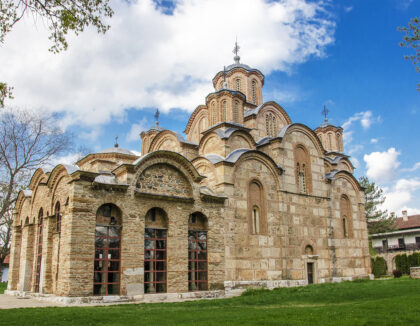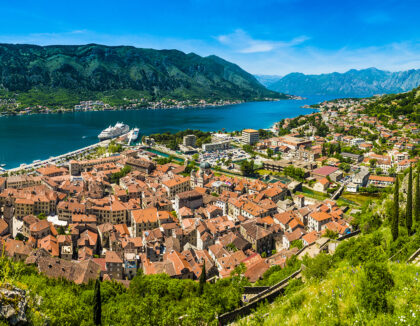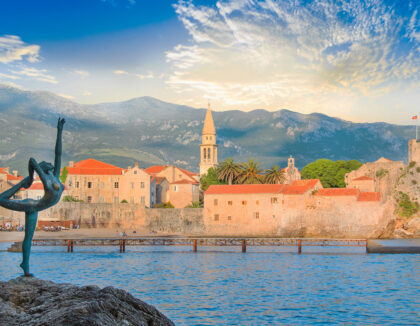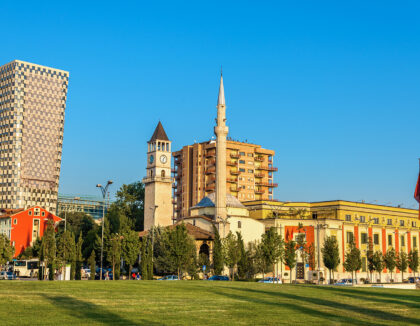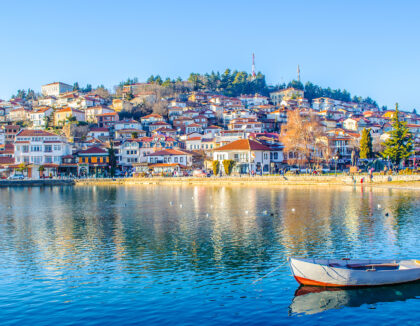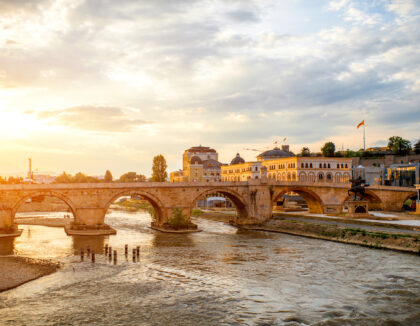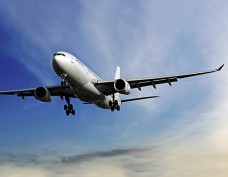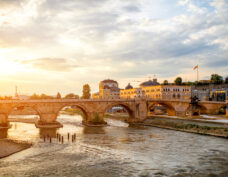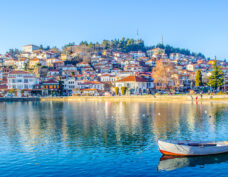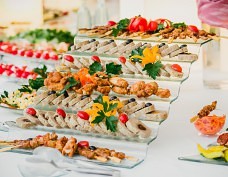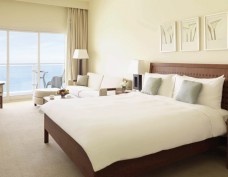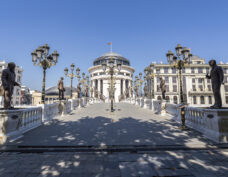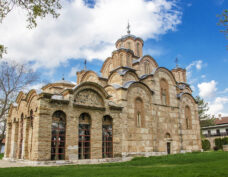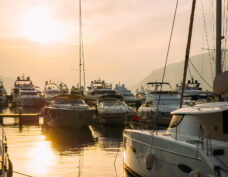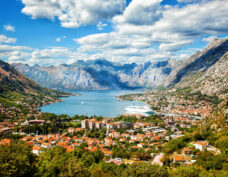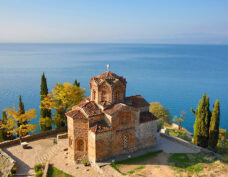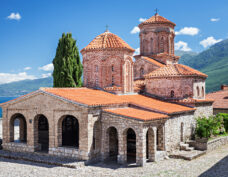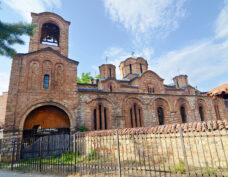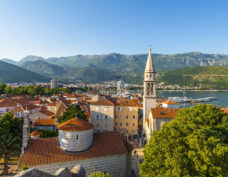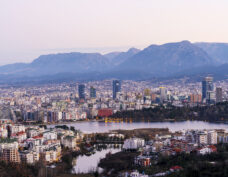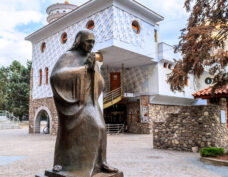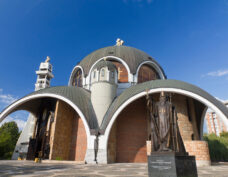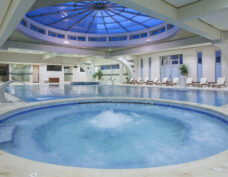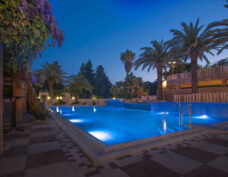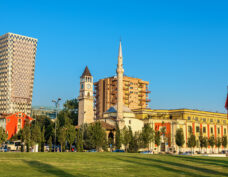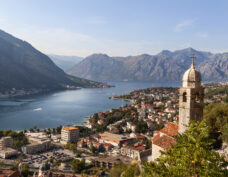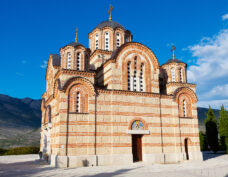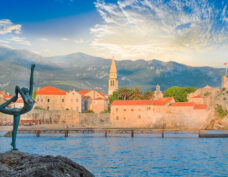Comparison of temperatures
| Jan | Feb | Mar | Apr | May | Jun | Jul | Aug | Sep | Oct | Nov | Dec |
| Skopje | 5 | 9 | 12 | 19 | 23 | 26 | 31 | 31 | 25 | 18 | 10 | 6 |
| London | 6 | 8 | 9 | 11 | 15 | 20 | 21 | 20 | 19 | 15 | 10 | 7 |
General note:
Below is an information overview. The conditions of entry, as well as the political and health situation, can change anywhere in the world at any time. We therefore recommend checking before your trip. Please check the website of the Foreign Office (www.gov.uk) before your departure.
Location:
The Balkan Peninsula is located in south-east Europe and extends into the Mediterranean Sea. The Balkan Mountains give the region its name.
Capital:
Albania: Tirana
Kosovo: Pristina
Montenegro: Podgorica
North Macedonia: Skopje
Form of government:
Albania: Parliamentary democracy
Kosovo: Republic / parliamentary democracy with unicameral parliament
Montenegro: Republic
North Macedonia: Parliamentary democracy
Religion:
Predominantly Roman Catholic, with occasional Slavic, Albanian and Turkish Muslims.
Language:
Albania: Albanian
Kosovo: Albanian and Serbian; in some regions, Bosnian, Turkish and Romani are recognised as minority languages.
Montenegro: Montenegrin, Serbian, Bosnian, Albanian and Croatian
North Macedonia: Macedonian; in some regions, Bosnian, Turkish, Romani and Albanian are recognised as minority languages.
Climate:
Along the Adriatic coast it is Mediterranean, inland it is moderate continental with pronounced, seasonal temperature fluctuations. The countries are located in a seismically active zone, which can lead to earthquakes.
Local time:
Central European Time (CET) with summer / winter time changeover applies in all four countries. The time difference to the UK is +1 hours all year round.
Electricity:
230 Volt Alternating Current, 50 Hertz. An adapter is required.
Making telephone calls:
For calls to the UK, please dial the country code 0044 (+44) first. The dialling code for long-distance calls from the UK to Albania is 00355 (+355), to Kosovo 00383 (+383), to Montenegro 00382 (+382) and to North Macedonia 00389 (+389). The 0 before the area code is omitted each time.
Country and people:
Few countries are as rich in history as Albania, Kosovo, Montenegro and North Macedonia. A visit also involves exploring bazaars, where you can savour a unique atmosphere. The carpet, jewellery and leather goods trades are solid, sometimes centuries-old components of the regional culture. Therefore, during our round trip, we will visit a jewellery manufacturer, a leather trader and a modern carpet gallery. Here, you will learn interesting facts about the art of carpet craftsmanship and experience how a hand-knotted carpet has been created for generations. As part of fascinating demonstrations, you will learn more about the preparation of silk threads, the natural dyeing of wool and the delicate and very time-consuming knotting process. In the respective manufacturers, you will then also have 1-2 h to view artworks and products. Bargaining is part of the local customs. If you are not interested in making a purchase, the traders also accept a clear no. Bargaining is not done in department stores and supermarkets. This also applies to markets where local farmers sell their vegetables.
Entry requirements for British citizens:
Albania: You do not need a visa to enter Albania for tourism or business purposes for up to 90 days in a 180-day period. Your passport must have an ‘expiry date’ at least 3 months after the day you plan to leave Albania. You will be denied entry if you do not have a valid travel document or try to use a passport that has been reported lost or stolen.
Kosovo: You do not need a visa to enter Kosovo for tourism or business purposes for up to 90 days in a 180-day period. Your passport must be undamaged and valid for the duration of your stay. You do not need an additional period of validity beyond this. You may be asked to provide documentary evidence giving a reason for your stay or showing you have suffi cient fi nances. Offi cials will issue a 90-day entry stamp, which is renewable for longer stays.
Montenegro: You do not need a visa to enter Montenegro for tourism or business purposes for up to 90 days in a 180-day period. To enter Montenegro, your passport must be issued less than 10 years before the date you enter the country (check the ‘date of issue’) and be valid for at least 3 months after the day you plan to leave (check the ‘expiry date’). You will be denied entry if you do not have a valid travel document or try to use a passport that has been reported lost or stolen.
North Macedonia: You do not need a visa to enter North Macedonia for tourism or business purposes for up to 90 days in a 180-day period. Make sure your passport is valid for at least 90 days from your date of entry into North Macedonia.
Nationals of other countries are advised to enquire at the respective Embassy about the entry requirements applicable to them. Whilst we endeavour to provide guidance where necessary, we can not be responsible for any problems encountered (whether at any point of entry or elsewhere) in the event that passport and visa requirements are not satisfi ed. For more information, please visit https://www.gov.uk/foreign-travel-advice/.
Tour guides:
Your tour guides will be able to provide you with detailed information on the country, people, history, culture etc., and offer advice and assistance in organising your trip. They can also help with room allocation and look forward to welcoming you with initial information. Here you will fi nd out all you need to know and useful information about the trip. We have put together a varied programme including numerous highlights, enabling you to experience the culture and diversity of landscape that Albania, Kosovo, Montengro and North Macedonia have to offer, and learn all about the countries and its people.
Additional packages:
Although your trip already includes a comprehensive package, you also have the option of choosing added extras. We recommend booking the following packages:
Gourmet package: The package includes a delicious buffet every evening with international specialities: only £139* per person.
Explorer package: The package includes the two boat trips on Lake Ohrid and in Kotor and the excursion ‘Skopje by night and wine‘: only £109* per person.
Tourist tax:
In each country a bed tax of up to 3€ (approx. £2.50) per person/day is payable on site (last revised: September 2024).
Currency:
Montenegro and Kosovo are part of the European Monetary Union; thus, the currency is the Euro. Exchange rate (as of September 2024): 1 GBP = 1.18 EUR; 1 EUR = 0.85 GBP
Albania: The unit of currency is the Albanian Lek (ALL). 1 ALL = 100 Quindarka. Exchange rate (as of September 2024): 1 GBP = 116.95 ALL; 1 ALL = 0.008 GBP
North Macedonia: The unit of currency is the Denar (MKD). 1 MKD = 100 Deni. Exchange rate (as of September 2024): 1 GBP = 72.41 MKD; 1 MKD = 0.014 GBP
Banks/Credit cards:
Albania: Card payment using a debit or credit card is rather the exception. Cash withdrawal in the local currency is generally possible without any problems at ATMs with the appropriate signage using a debit and credit card in the larger cities.
Kosovo: In many restaurants and larger shops, it is possible to pay with a credit card. Payment and cash withdrawal at ATMs is often not possible with British bank cards. The banking system is functional, ATMs are relatively well established even outside of the major cities.
Montenegro: Common credit cards are accepted nationwide. Cash machines are widely available. The acceptance of V-Pay and Maestro bank cards is limited. These can only be used to withdraw cash at a few cash machines, but not for general payment transactions.
North Macedonia: The provision of cash with bank or credit cards is possible in Skopje and larger cities, but only sporadically in small provincial towns. Not all hotels accept credit cards. Almost everywhere, cash payment with GBP or exchange into Denar is possible. Most home banks charge a foreign transaction fee per withdrawal. Please inform yourself before your trip.
Customs regulations:
Albania: Import of national currency or foreign currency must be declared from a value of 1,000,000 ALL. Albania prohibits the import of drugs, weapons and pornographic material.
Kosovo: Import of cash in unlimited amounts possible. Amounts over 10,000 EUR must be declared.
Kosovo and Montenegro: The following goods have restrictions on duty-free import: 1 l spirits over 22% or 2 l table wine, sparkling wine, fortified wine, liqueur, 200 cigarettes or 100 cigarillos or 50 cigars or 250gr tobacco or 250 gr of any mixture of the mentioned products, 50 ml perfume or 250 ml eau de toilette, gifts and souvenirs up to 175 EUR.
North Macedonia and Montenegro: The import and export of foreign currency and items to Montenegro and North Macedonia is permitted up to an amount equivalent to 10,000 EUR and must be declared from this amount onwards.
Montenegro: Travel luggage and personal necessities can be imported into Montenegro duty-free, but must be exported again. For certain items (cameras, laptops etc.) there are numerical restrictions. When importing drones, they must be approved by the Montenegrin air traffic licensing authority and an import licence must be obtained. The customs regulations for British nationals can change at short notice. Therefore, please inquire in advance with the representations of your destination country.
Important: If you are travelling to Great Britain from outside the UK, your personal allowances mean you can bring in a certain amount of goods without paying tax or duty. If you go over your allowances you must declare all your goods and pay tax and duty on all the goods in that category. Please inform yourself about the current customs regulations: www.gov.uk/bringing-goods-into-uk-personal-use/arriving-in-Great-Britain
Country-specific safety advice:
In all countries, there can occasionally be instances of violent protests and demonstrations, particularly in major cities and capitals. Therefore, avoid demonstrations and large crowds. In North Macedonia, the authorities do not always have timely assistance and access options. Petty crime such as pickpocketing, handbag theft or occasional car break-ins occur particularly in tourist centres, such as beaches, airports, train stations, city centres or larger crowds. Driving licenses and travel documents, as well as travel documents with residence permits, are desirable theft targets. Travellers should therefore always keep an eye on their personal items and identification. It is recommended to pay without cash and only take the cash needed for the day.
Special criminal provisions:
In all countries, the possession, trade, consumption and transport of drugs within the country and abroad is punishable by law. This also applies to smaller amounts intended solely for personal use.
Albania: Sexual acts in public can be punished with fines or with a prison sentence of up to 1 year.
North Macedonia: The unauthorised photographing or other documenting of military and strategic facilities is criminally prosecuted.
Medical information:
At least 8 weeks before your trip, check the latest country-specific health advice from the National Travel Health Network and Centre (NaTHNaC – https://travelhealthpro.org.uk/countries) on the Travel HealthPro website. Each country-specific page has information on vaccine recommendations, any current health risks or outbreaks, and factsheets with information on staying healthy abroad. Diarrhoea and other infectious diseases can be avoided by eating and drinking hygienically and using mosquito repellent.
Medical care:
Medical care to British standards is not guaranteed in all countries. Operations should only be carried out in the most extreme emergencies. Hospitals do not always have adequate facilities and are sometimes not capable of providing appropriate medical care to patients with certain conditions. Hygiene is generally not sufficient.
Kosovo: The medication must be purchased privately in all cases. Doctors often offer enhanced private treatments, provided one pays the desired price.
North Macedonia: The medical care in the capital, Skopje, is very good in the private sector and also good or very good in many areas of the public sector. English-speaking doctors are often encountered. Outside of the capital, however, medical care can often be problematic and frequently is not technically, equipment-wise, and / or hygienically up-to-date. Staff shortages, particularly in the nursing field, are a common problem.
It is recommended to take out international health insurance with the option of medical repatriation to the UK.
Customers must ensure that they are in good physical and mental health in line with the trip in question. Customers must enquire about the physical mobility and psychological autonomy required for this trip.
All information is subject to change/Last updated: June 2024
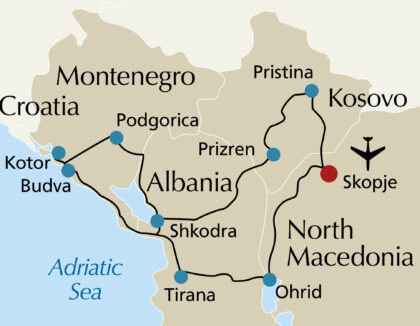
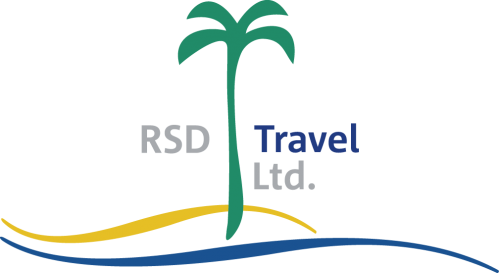




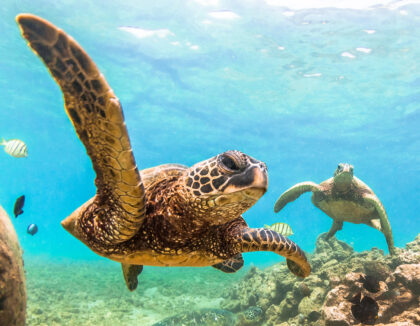 Travel highlights
Travel highlights
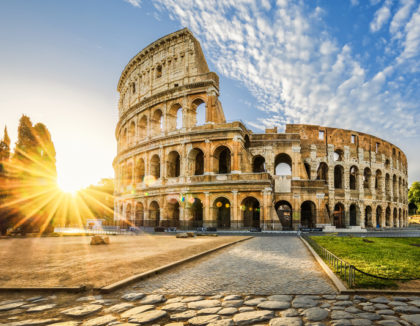 Europe
Europe
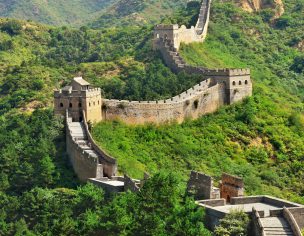 Asia
Asia
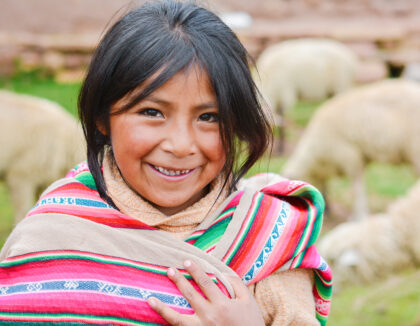 America
America
 Africa
Africa
